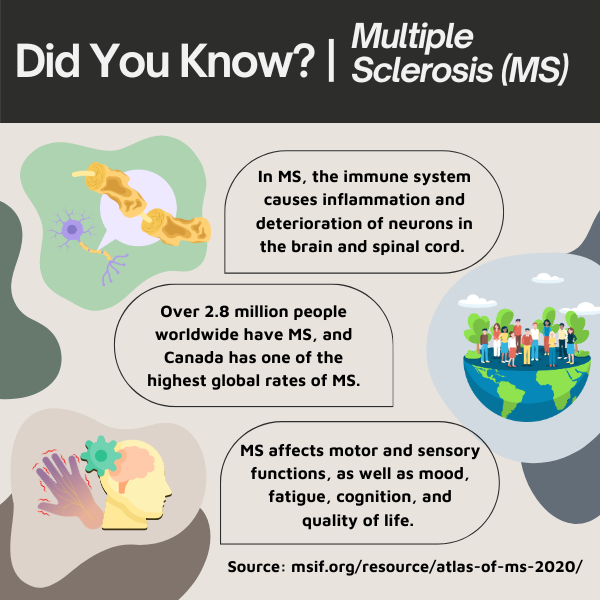New therapies are giving hope to people who live with MS. Members of the uOBMRI MS Group are leading research aimed to identify novel therapies and interventions, develop better treatments, and improve outcomes for those with MS and their loved ones.
Developing Better Treatments for MS
Dr. Rashmi Kothary is investigating how molecules called microRNAs regulate gene networks responsible for the process whereby oligodendrocytes become myelin (the coating around nerve fibres in the brain and thought to be the cause of inflammation behind MS). This is an important step towards the development of better treatments for MS.
Improving Outcomes with Exercise
Dr. Lara Pilutti and members of her Clinical Exercise Physiology Laboratory are working towards improving outcomes in those with progressive forms of MS. Exercise training improves mobility in those with MS but those with substantial walking impairment have often been excluded.
International Collaboration to Examine New Stem Cell Therapies
Dr. Mark Freedman and Dr. Harry Atkins and their Stem Cell Team have done groundbreaking work demonstrating the utility of hematopoietic stem cell transplantation at halting disease activity in those with aggressive forms of MS. As part of an international collaborative group, they have also investigated the safety of mesenchymal stem cell therapy, a process that does not involve immunoablation, and may be more tolerable than other stem cell procedures.
Designing Interventions to Improve Cognitive Fatigability
Dr. Lisa Walker and members of her Cognitive Health in MS Research Lab are studying cognitive fatigability (i.e., performance decline after sustained cognitive effort) given that over 90% of people with MS report fatigue as one of their worst symptoms. They have established normative data so that measurement of cognitive fatigability can be implemented into clinical practice, and they are designing interventions in the hopes of improving cognitive fatigability.
Models of Remyelination
Drs. Jing Wang (Senior Scientist), Lisa Walker (Neuropsychologist) and Mark Freedman (Neurologist) who are studying the potential impact of Metformin treatment on cellular mechanisms (i.e., monoacylglycerol lipase levels) and social cognition in people living with MS. This work is an example of translational research given that it evolved from Dr. Wang’s laboratory research that demonstrated that Metformin promotes remyelination (i.e., repair) and improves social cognition in a mouse model of MS. The MSRG-funded pilot grant will allow for the collection of data from people living with MS and co-morbid diabetes to determine if Metformin treatment has a positive impact on both biomarkers and social cognition.


